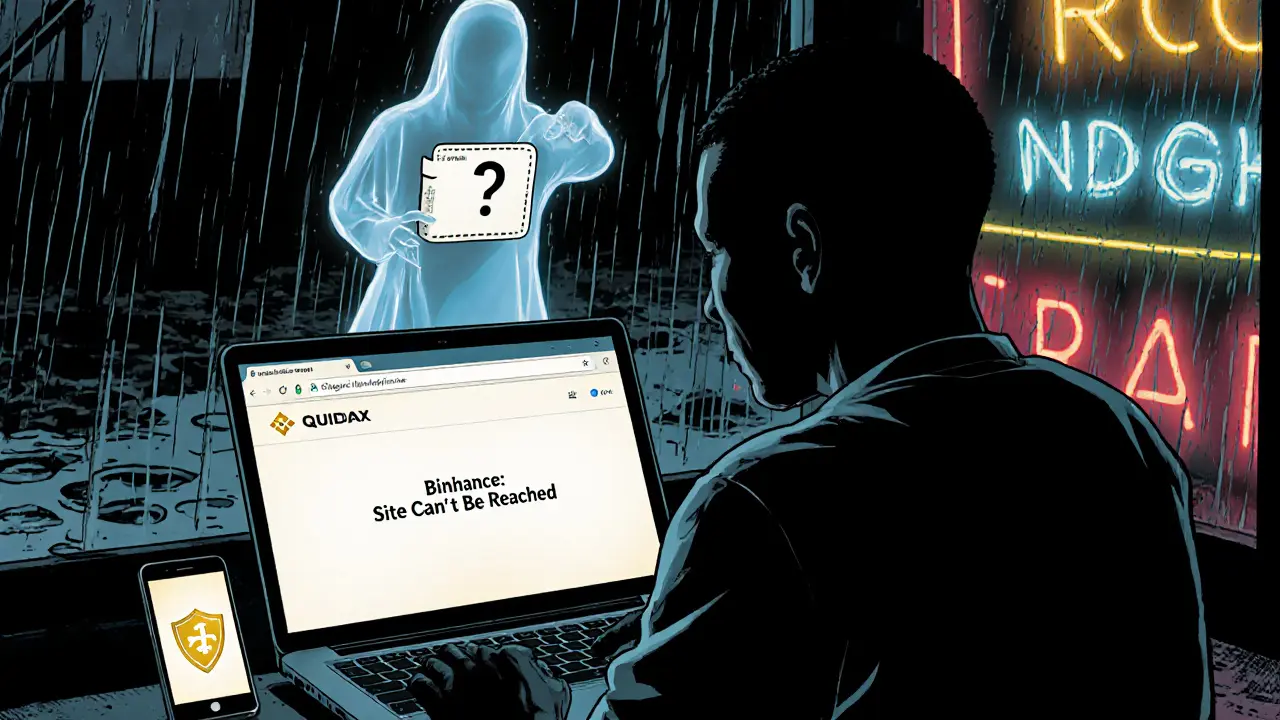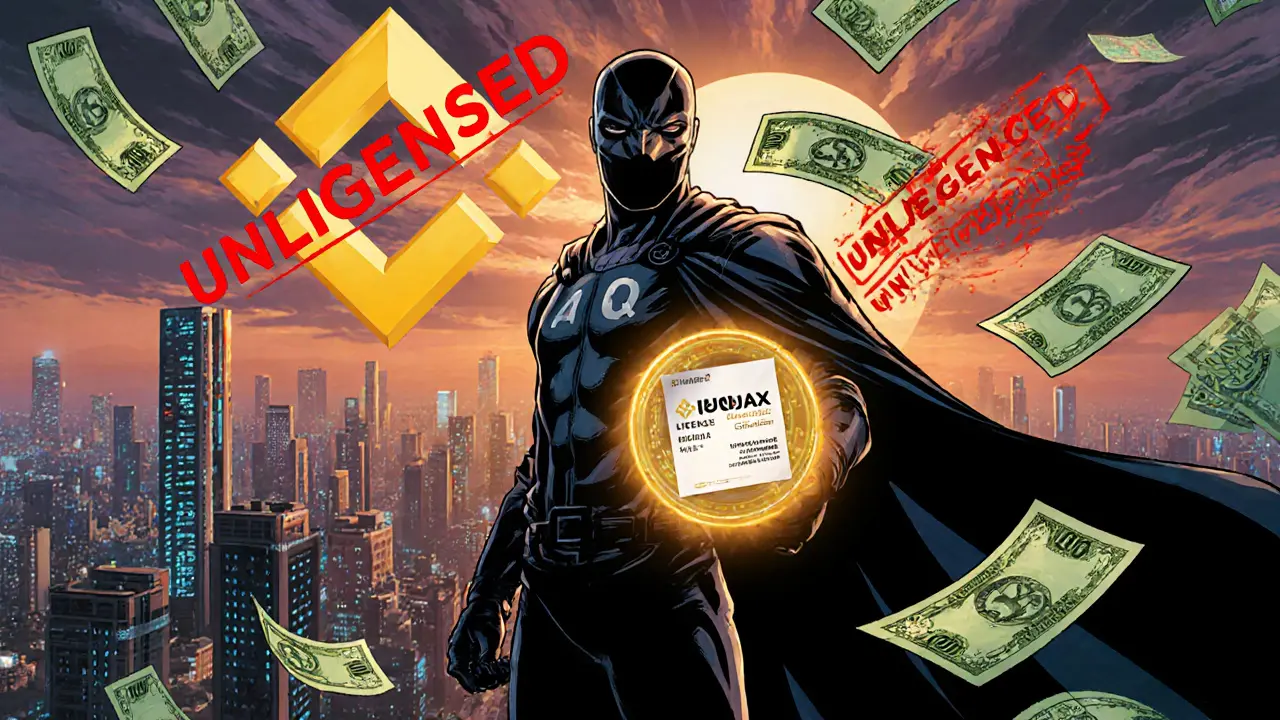Nigeria Crypto Exchange License Checker
Check Exchange Licensing Status in Nigeria
Nigeria doesn't ban crypto exchanges but requires SEC licensing. Only licensed platforms (Quidax, Busha) are fully legal. Enter an exchange name to check its status.
Licensed vs. Unlicensed Exchanges
Understanding the difference is crucial for your security and legal protection in Nigeria.
| Feature | Licensed Platforms (e.g. Quidax, Busha) |
Unlicensed Platforms (e.g. Binance, Kraken) |
|---|---|---|
| Legal Status | Fully Legal | Not Authorized |
| Naira Transactions | Enabled | Restricted or Blocked |
| User Protection | Regulatory Protection | No Legal Recourse |
| Security Standards | Mandatory KYC/AML | Limited or No Compliance |
| Tax Reporting | Required for all users | Not Applicable |
| Risk Level | Low | High |
What This Means for You
Using licensed exchanges provides important protections:
- You have legal recourse if your funds are lost
- Your transactions are properly recorded for tax purposes
- You're protected from regulatory actions
- You can use naira deposits and withdrawals without restrictions
Nigeria doesn’t have a blanket ban on crypto exchanges anymore. That’s the first thing you need to understand. If you’re reading this because you heard crypto is illegal there, you’ve been misled. The truth is more complicated - and more practical.
There Are No Officially Banned Exchanges, Just Unlicensed Ones
The Nigerian government didn’t outlaw crypto exchanges. Instead, it created a licensing system. Under the Investments and Securities Act (ISA) 2025, signed in March 2025, every crypto exchange operating in Nigeria must be licensed by the Securities and Exchange Commission (SEC). If a platform doesn’t have that license? It’s not allowed to offer services to Nigerian users. That’s not a ban - it’s a rule.Think of it like a restaurant. You can’t serve food without a health permit. If you try, the government shuts you down. That doesn’t mean all restaurants are banned. It just means only the ones that follow the rules get to operate.
So when people say “Binance is banned in Nigeria,” they’re not entirely wrong - but they’re not telling the whole story. Binance hasn’t been outlawed. It just hasn’t applied for or received a Nigerian license. That’s why it stopped offering Naira deposits and withdrawals in February 2024. Nigerian users can still log in, hold crypto, and trade between digital assets. But they can’t buy Bitcoin with naira directly on Binance anymore. To access the full platform, many use VPNs. That’s a workaround, not a legal solution.
Only Two Exchanges Are Fully Licensed - So Far
As of late 2025, only two crypto exchanges have received full SEC approval to operate legally in Nigeria: Quidax and Busha.These platforms had to jump through serious hoops to get licensed. They had to prove they had:
- Strong KYC (Know Your Customer) systems to verify user identities
- Anti-Money Laundering (AML) monitoring tools
- Secure digital wallets with cold storage
- Local customer support teams
- Compliance with Nigeria’s tax reporting rules under the new Nigeria Tax Administration Act (NTAA) 2025
They also had to submit detailed financial records, audit reports, and operational manuals. The process took over a year for most applicants. Smaller or foreign exchanges didn’t have the resources to complete it.
That’s why you won’t find Binance, Kraken, Coinbase, or Bybit on the official SEC licensed list. They’re not banned - they’re just not licensed. And without a license, they can’t legally accept naira or market their services to Nigerians.
What Happens If You Use an Unlicensed Exchange?
There’s no law saying you, the user, will go to jail for using Binance or another unlicensed platform. The SEC doesn’t go after individual traders. They go after the companies.But here’s the catch: if you use an unlicensed exchange, you have zero legal protection. If your account gets hacked, frozen, or the platform disappears, you can’t file a complaint with the SEC. No regulator will step in to help you recover your funds. Licensed exchanges like Quidax and Busha are required to have insurance and dispute resolution systems. Unlicensed ones aren’t.
Also, telecom providers in Nigeria have been ordered to block access to domains of unlicensed platforms. That’s why you might see “This site can’t be reached” when trying to load Binance’s website on your mobile data. It’s not a government decree against crypto - it’s a network-level restriction on unlicensed services.

Why Did Nigeria Change Its Mind?
Back in 2021, the Central Bank of Nigeria (CBN) told banks to stop servicing crypto businesses. That created chaos. People couldn’t deposit naira. Exchanges shut down. But the ban didn’t stop crypto use - it just pushed it underground.By 2023, the CBN reversed course. They realized Nigerians were sending over $92 billion in crypto between July 2024 and June 2025 - more than any other African country. That’s not a glitch. That’s a movement. People were using crypto to send remittances, save money, and trade. Trying to stop it was like trying to stop water from flowing downhill.
The ISA 2025 was the government’s way of saying: “We can’t stop this. So let’s control it.”
The new law also gives regulators more power. The Economic and Financial Crimes Commission (EFCC) and the Nigerian Financial Intelligence Unit (NFIU) can now access telecom data to track fraud. Ponzi schemes disguised as crypto investments are now explicitly illegal. And if a licensed exchange fails to report transactions, it faces fines of ₦10 million ($6,693) in the first month - plus ₦1 million ($669) for every month after.
What About Decentralized Exchanges (DEXs)?
This is where things get blurry. Platforms like Uniswap or PancakeSwap don’t have a physical office in Nigeria. They’re decentralized. No central company to shut down. No license to apply for.The SEC hasn’t officially said whether DEXs are legal or illegal. But the law targets “Virtual Asset Service Providers” - which usually means centralized platforms that hold user funds. DEXs don’t hold your crypto. You control your wallet. So technically, they fall outside the current scope.
But that could change. Regulators are watching. If DEXs start attracting large volumes of Nigerian users, expect new rules. For now, they’re in a gray zone. Use them at your own risk.

What’s Next for Crypto in Nigeria?
More licenses are coming. The SEC is reviewing applications from other local platforms like PalmPay Crypto and NairaEx. International exchanges like Bitstamp and Crypto.com are reportedly preparing applications too.The new tax law (NTAA 2025), taking effect in 2026, will require exchanges to report user transactions to the Federal Inland Revenue Service. That means crypto gains may become taxable. If you’re trading frequently, keep records.
Stablecoins like USDT and USDC are also under review. The SEC hasn’t banned them, but they’re being classified as securities if used for investment purposes. That could affect how they’re traded and taxed.
For now, the safest path is simple: use Quidax or Busha. They’re legal. They’re regulated. They protect your money. If you want to use Binance, you can - but you’re on your own.
What Should You Do?
If you’re in Nigeria and want to trade crypto in 2025:- Use Quidax or Busha for buying, selling, and storing crypto with naira.
- Keep your private keys safe - even licensed exchanges can be hacked.
- Don’t use unlicensed platforms if you care about legal protection.
- Save records of all trades for tax purposes in 2026.
- Stay updated - the SEC releases new guidance every quarter.
The days of Nigeria being a crypto-free zone are over. The days of wild west trading are ending too. The new system isn’t perfect. But it’s real. And it’s here to stay.
Is Binance completely banned in Nigeria?
No, Binance is not officially banned. It stopped offering Naira deposits and withdrawals in 2024 because it doesn’t have a Nigerian license. Nigerian users can still access Binance for crypto-to-crypto trades using a VPN, but they can’t buy Bitcoin with naira directly on the platform. Access is restricted, not outlawed.
Are there any legal crypto exchanges in Nigeria?
Yes. As of 2025, only two exchanges are fully licensed by Nigeria’s SEC: Quidax and Busha. These platforms follow strict KYC, AML, and tax reporting rules. Any other exchange operating without a license is not legally permitted to serve Nigerian customers.
Can I get in trouble for using Binance in Nigeria?
No, individual users won’t be arrested or fined for using unlicensed exchanges. The Nigerian government targets the companies, not the users. But if you use an unlicensed platform, you have no legal recourse if something goes wrong - no refunds, no complaints, no protection.
Why did Nigeria stop banning crypto?
Nigeria realized it couldn’t stop crypto use. Between July 2024 and June 2025, over $92 billion in crypto flowed into the country - more than any other African nation. The government shifted from banning to regulating, creating a licensing system to bring crypto into the formal economy and protect users.
Will more exchanges get licensed in Nigeria?
Yes. The SEC is currently reviewing applications from several local and international platforms. More licenses are expected throughout 2025 and 2026. The goal is to create a competitive, regulated market where users have safe, legal options.


Petrina Baldwin
October 27, 2025 AT 16:32So Binance isn’t banned, just ignored by regulators. Classic.
Sonu Singh
October 28, 2025 AT 10:01man i use binance daily with vpn n its fine but quidax is slow as hell. why do they make kyc so long? i just wanna trade lol
Peter Schwalm
October 29, 2025 AT 05:13Good breakdown. The key thing people miss is that this isn’t about banning crypto-it’s about bringing it into the formal economy. Licensed exchanges have insurance, dispute resolution, and tax reporting. Unlicensed ones? You’re on your own. That’s not oppression, that’s basic consumer protection.
olufunmi ajibade
October 29, 2025 AT 06:55As a Nigerian, I’ve seen this whole mess from the inside. The CBN’s 2021 ban was pure panic. People were using crypto to feed their families. Now? We’re finally treating it like finance, not crime. Quidax and Busha are the only ones who care enough to play by the rules. The rest? They’re just tourists.
Shruti rana Rana
October 29, 2025 AT 08:33India is watching Nigeria closely 🇮🇳🇳🇬. If a developing nation can regulate crypto without crushing innovation, maybe we’ll finally stop treating it like a scam. Also, 🙌 to Quidax for making KYC actually work. No more 3-day waits for withdrawals!
Cyndy Mcquiston
October 29, 2025 AT 14:11Why do we even let foreign platforms operate here? Let local companies build the ecosystem. No more Binance. No more Coinbase. Nigeria’s money should stay in Nigeria.
Nick Carey
October 30, 2025 AT 13:22So I can’t buy BTC with naira on Binance but I can still trade it with someone else using a P2P bot? Cool. So the government banned the middleman but not the actual thing. Brilliant.
Stephanie Alya
October 31, 2025 AT 03:23Oh so now crypto is ‘regulated’? Cute. Next they’ll tax your Dogecoin gains and call it ‘financial inclusion’. 😂
John E Owren
October 31, 2025 AT 05:36The analogy of the restaurant license is spot on. You wouldn’t let an unlicensed chef serve you food. Why should you let an unlicensed exchange hold your Bitcoin? This isn’t censorship-it’s responsibility. And the fact that Nigerians moved $92B in crypto anyway proves the demand was always there. The government just caught up.
Manish Gupta
November 2, 2025 AT 02:40DEXs are the real future. No license needed, no KYC, no middleman. If SEC tries to ban Uniswap, good luck blocking millions of wallets. They’ll never win that war.
Ralph Nicolay
November 3, 2025 AT 19:59It is imperative to note that the regulatory framework established under the Investments and Securities Act (ISA) 2025 constitutes a paradigmatic shift in the governance of digital asset services within the Nigerian jurisdiction. The absence of licensure does not equate to prohibition, but rather signifies non-compliance with statutorily mandated operational and fiduciary obligations. This constitutes a legally defensible and economically prudent policy trajectory.
Gabrielle Loeser
November 4, 2025 AT 16:37While the licensing system provides structure, it also creates barriers for innovation. Smaller platforms with limited resources are effectively shut out. A tiered licensing model-perhaps based on transaction volume-could encourage broader participation without compromising security. Regulation should empower, not exclude.
Alex Horville
November 4, 2025 AT 18:26Let’s be real-this is just the Nigerian government trying to control money flow so they can tax it. Crypto was supposed to be free from banks and bureaucrats. Now it’s just another IRS target with extra steps.